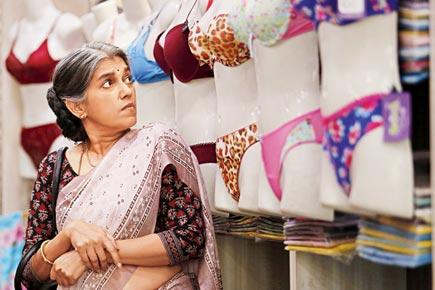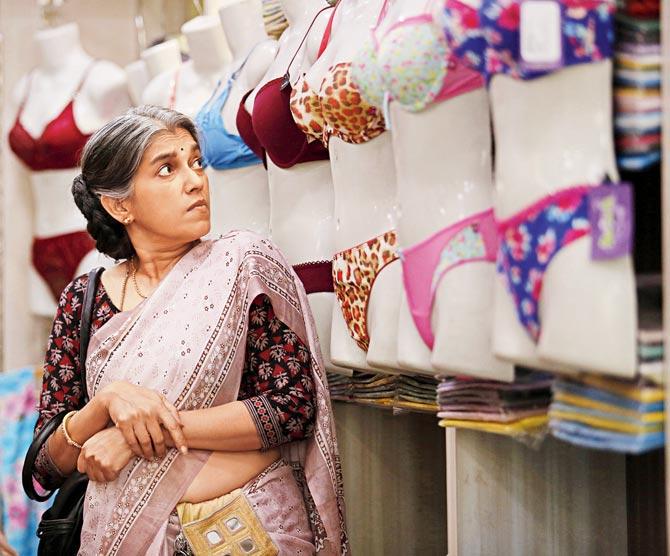Alankrita Shrivastava's Lipstick Under My Burkha is a poignant, brutally honest and compelling film about ordinary women and their desires


Ratna Pathak Shah in the role of Buaji in Lipstick Under My Burkha
ADVERTISEMENT
 Alankrita Shrivastava's Lipstick Under My Burkha is a poignant, brutally honest and compelling film about ordinary women and their desires. Bollywood's stereotypes have so firmly etched the heroine's sole aim in life as getting married to the hero, that to find ordinary women actively struggling to avoid marriage or struggling within it, has come as a shock and a revelation to the Censor Board. They tried hard to ban the film because "the story is lady-oriented, their fantasy about life", which the appellate tribunal cleared with an 'A' certificate.
Alankrita Shrivastava's Lipstick Under My Burkha is a poignant, brutally honest and compelling film about ordinary women and their desires. Bollywood's stereotypes have so firmly etched the heroine's sole aim in life as getting married to the hero, that to find ordinary women actively struggling to avoid marriage or struggling within it, has come as a shock and a revelation to the Censor Board. They tried hard to ban the film because "the story is lady-oriented, their fantasy about life", which the appellate tribunal cleared with an 'A' certificate.
Lipstick weaves the stories of four women in small-city Bhopal-with-a-mall: burqa-clad collegian Rehana wants to be a pop singer, but her parents tie her down to a sewing machine. Shirin's unemployed, two-timing husband rapes her more violently on discovering she has a saleswoman job. The randy Leela, who runs a beauty parlour, enjoys sex with her boyfriend, and is allergic to the institution of marriage. The middle-aged widow Buaji aka Usha, who enjoys Mills and Boon romances, has the hots for her swimming coach. The film explores not only their sexual desires, but how they daily suffer the slings and arrows of outrageous fortune, just because they want a little freedom to keep a job, enjoy themselves, and cut loose.
What makes the film special is its eye for detail, wry humour and dialogues by Gazal Dhaliwal. Buaji, who is embarrassed to buy herself a swimsuit, tells the salesman, "Ladki healthy hai thodi". Shrivastava's confident screenplay allows the big whoppers to be almost incidental. Leela films herself having sex with her boyfriend, and threatens to put up the video on Facebook if he is unfaithful. Wow! That is some role reversal since the blackmailing cop of Masaan. Leela has a bindaas affair with Arshad, and it isn't even underlined that he is Muslim. Ditto with Rehana and Dhruv. Not bad for Shrivastava, in her second feature, after Turning 30!!!
The men represent a panoply of wretchedness and patriarchy. Dhruv drops Rehana the moment he discovers she's not a hip singer but a burqa-wearer. Shirin's husband is a serial rapist and two-timer. Leela's boyfriend Arshad is a womaniser, and even her gulab jamun-sweet fiancé can only offer her a life squeezed in between a house full of patriarchs. A voiceover of a pulp romance about Rosie holds the four skeins together: Rosie was also the name of the spunky protagonist in Guide. There was female bonding earlier in Parched, Angry Indian Goddesses and Mirch Masala, but here we see more lived-in lives. The climax falters with the staged humiliation of Buaji and Rehana, and sisterhood over ciggies, but that is small fry compared to what the film achieves.
Ratna Pathak-Shah is luminous and magnificent and wreaks heartache; each of the other actresses sparkle — Konkona Sensharma, Ahaana Kumra and Plabita Borthakur. Vikrant Massey and Shashank Arora are good, too. The film has an almost all-women crew in key roles. The nearly all-male audience in Gaiety-Galaxy whistled during the sex scenes, and, when Shirin was raped, one man hooted, "ho gaya, ho gaya", as one might, to comfort a bawling child. It's a smart move to have all-women shows. Years ago, I went to an all-women screening of Deepa Mehta's Fire in Mumbai: they had organised a creche, so women with kids could attend. It was housefull, and the women stood up, clapped and roared throughout the film. And yes, I'm going to resume swimming soon.
Meenakshi Shedde is South Asia Consultant to the Berlin Film Festival, award-winning critic, curator to festivals worldwide and journalist. Reach her at meenakshishedde@gmail.com
 Subscribe today by clicking the link and stay updated with the latest news!" Click here!
Subscribe today by clicking the link and stay updated with the latest news!" Click here!






